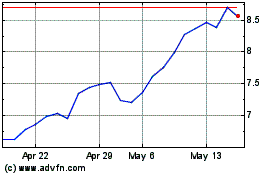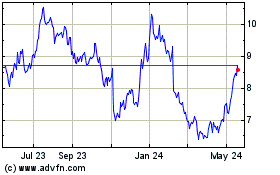By Costas Paris and Benoit Faucon
The Suez Canal remained shut Thursday as Egyptian authorities
worked to clear a ship blocking the critical waterway and shipping
experts warned a resumption of traffic through the channel could
still be days, if not weeks, away.
The canal, which connects markets from Europe to Asia, is a
transit point for oil products refined in Europe and crude oil from
North African and Black Sea ports. Exporters and customers on both
continents were girding for delays.
Singapore's transport minister told port authorities to prepare
for disruptions. "Some draw down on inventories will become
necessary" if the blockage is prolonged, Ong Ye Kung said in a
Facebook post Thursday. Ducati Motor Holding said some customers of
its high-end motorcycles, built at a Bologna, Italy, plant,
probably won't get their bikes on time.
Tugboats and a dredger resumed work early Thursday to dig out
the Ever Given -- a 1,300-foot ship operated by Taiwan-based
Evergreen Group -- partially refloat it and move it out of the way.
As the day progressed, people involved in the operation described
an increasingly tricky engineering and logistics challenge.
The bow of the ship is still wedged deep into one side of the
canal, requiring dredging, these people said. The ship needs to be
lightened by taking off fuel, ballast water and, possibly, a
portion of its container cargo. With no cranes high enough along
the stretch of canal where the ship is marooned, helicopters are
the only option. Officials are hoping a higher-than-normal tide
expected over the weekend could help lift the ship free.
Evergreen has hired Dutch ship-salvage specialist Smit Salvage
to help with the operation. Peter Berdowski, Chief Executive of
Smit parent Royal Boskalis Westminster, told Dutch state television
that the operation "can take days to weeks."
Danish shipping giant A.P. Moller-Maersk A/S told customers it
expected a traffic backlog to grow. "The incident continues to
create long tailbacks on the waterway, stopping vessels from
passing and causing delays," it said in an advisory. Maersk, the
world's biggest liner company in terms of capacity, said four of
its vessels were stuck in the canal and another three were waiting
to enter.
Suez Canal service provider Leth Agencies said Thursday that 70
northbound ships were stuck, along with another 79 southbound ships
-- up from about 100 vessels combined -- were waiting late
Wednesday. The World Shipping Council, a shipping trade body, said
a maximum 106 ships can cross the waterway a day, and warned it
could take a number of days to clear the queue of ships once the
Ever Given is pushed out of the way.
The Suez Canal Authority has reopened an older part of the
channel to divert some ships, but the passage can only handle
smaller vessels.
"We could be here for days," said Manolis Kritikos, a mechanic
at a Greek-operated tanker, stuck in the waterway. "Nothing is
moving, and the radio talk is that we'll be here until the
weekend."
Shoei Kisen Kaisha Ltd., the owner of the Ever Given, said it
was doing its best to free the ship but "the situation involves
extreme difficulty." Evergreen Group said it was informed by the
owner that the crew, ship and cargo were safe and there was no
marine pollution as a result of the grounding. The operator said it
would continue to coordinate with the owner and the canal authority
to free the vessel and "mitigate the effects of the incident." It
said, though, that responsibility for any expense incurred in the
recovery operation, third-party liability and the cost of repair is
the owner's.
The ship had been sailing to Rotterdam from China, according to
shipping data.
The Suez Canal is a vital trade route for tankers carrying oil
and natural gas, along with container ships moving manufactured
goods such as clothing, electronics and heavy machinery from Asia
to Europe and the other way around. Around 19,000 vessels crossed
the Suez in 2020, according to the Suez Canal Authority. Some 39
ships transit the Suez Canal daily on average, according to
maritime industry trade group Bimco.
Shipping operators occasionally divert ships from the canal to
the Cape of Good Hope around the southern tip of Africa to avoid
bottlenecks, but sailings can take two weeks longer and cost cargo
owners more in freight costs. Shippers said early Thursday they
were already taking alternative routes to get supplies of oil, gas
and other goods. Shipping costs have risen.
The cost of renting some tankers for voyages from the Middle
East to Asia has jumped 47% over the last three days, as shippers
seek replacements from deliveries that used to transit from Europe
to Suez, said Anoop Singh, Singapore-based head of tanker analysis
at Braemar ACM.
Avoiding the canal by sailing around Africa can add $450,000 in
costs per voyage, Mr. Singh said. As a result, vessels that were
already at the entrance of the canal or nearby have mostly stuck
with their plans so far. Braemar estimates the equivalent of 2
million barrels a day of crude and refined oil products are
currently stuck at the canal -- about 2% of global oil
consumption.
It was sailing northbound as part of a convoy when it got stuck
in the canal at around 7 a.m. local time Tuesday, according to Gulf
Agency Co., a service provider in the canal.
An Evergreen spokesperson said the ship was probably hit by
strong winds causing it "to deviate from the channel and run
aground."
Parts of the 120-mile long Suez Canal are a single lane stretch
waterway measuring just 300-feet wide, which can require ships to
travel through them in one direction at a time. Ships transit in
northbound and southbound convoys. Any ship getting stuck can stop
others from completing the transit.
William Boston contributed to this article.
Write to Costas Paris at costas.paris@wsj.com and Benoit Faucon
at benoit.faucon@wsj.com
(END) Dow Jones Newswires
March 25, 2021 13:15 ET (17:15 GMT)
Copyright (c) 2021 Dow Jones & Company, Inc.
AP Moller Maersk AS (PK) (USOTC:AMKBY)
Historical Stock Chart
From Dec 2024 to Jan 2025

AP Moller Maersk AS (PK) (USOTC:AMKBY)
Historical Stock Chart
From Jan 2024 to Jan 2025
